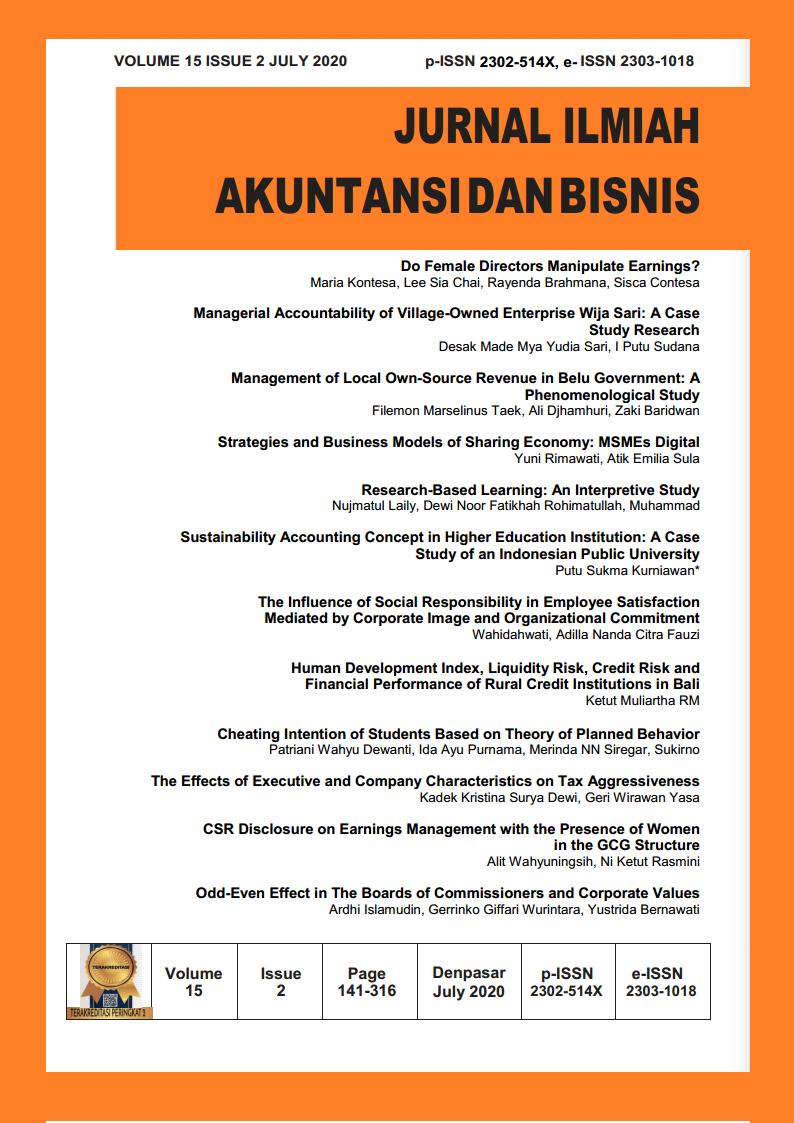Research-Based Learning: An Interpretive Study
Abstract
This research aimed at understanding lecturers and students’ views on research-based learning (RBL) in accounting. This was a qualitative study with interpretive paradigm. The data were obtained observation, interview and documentation. Meanwhile, the stages to analyze the data included data reduction, understanding, and interpretation. The research result showed that lecturers had varied understanding on research-based learning. The research result also indicated the minimum use of RBL by lecturers in their teaching since the course was less compatible in terms of its characteristics with RBL model. An important finding in this research was that RBL could improve student’s critical thinking and creativity as well as increase their confidence in writing scientific paper. However, as acknowledged by the informants themselves, it was hard to implement RBL since it demanded a huge amount of costs and the lecturer’s own ability to implement RBL was still low.
Keywords: accounting, RBL, critical thinking
Downloads
References
Cabral, A. P., & Huet, I. (2011). Research in higher education: The role of teaching and student learning. Procedia - Social and Behavioral Sciences, 29, 91–97. https://doi.org/10.1016/j.sbspro.2011.11.211
Dekker, H., & Wolff, S. W. (2016). Re-inventing Research-Based Teaching and Learning Paper prepared for presentation at the meeting of the European Forum for Enhanced Collaboration in Teaching of the European University Association in Brussels on 5 December 2016. (December).
Direktoral Jenderal Pendidikan Tinggi.2012. Surat Keputusan Publikasi Karya Ilmiah ,(Online), (www.kemdiknas.dikti.go.id/Downloads/SKDirjen152-E-T-2012KaryaIlmiah.pdf), diakses 15 Oktober 2016.
Khwanchai, K., Tanthip, K., & Toansakul, S. (2017). An instructional design model with the cultivating research-based learning strategies for fostering teacher students creative thinking abilities. Educational Research and Reviews, 12(15), 712–724. https://doi.org/10.5897/err2017.3239
Lander, J., Seeho, S., & Foster, K. (2019). Learning Practical Research Skills Using An Academic Paper Framework – An Innovative, Integrated Approach. Health Professions Education, 5(2), 136–145. https://doi.org/10.1016/j.hpe.2018.06.002
Nuchwana, L. (2013). How to Link Teaching and Research to Enhance Students’ Learning Outcomes: Thai University Experience. Procedia - Social and Behavioral Sciences, 69(Iceepsy), 213–219. https://doi.org/10.1016/j.sbspro.2012.11.401
Poonpan, S., & Suwanmankha, S. (2005). Indicators of Research-Based Learning Instructional Process :A Case Study of Best Practice in a Primary School. Retrieved from https://www.aare.edu.au/data/publications/2005/poo05581.pdf
Peraturan Mentri Pendidikan dan Kebudayaan Republik Indonesia (Permendikbud) Nomor 49 Tahun 2014 tentang Standar Nasional Pendidikan Tinggi
Saptuti Susiani, T., Salimi, M., & Hidayah, R. (2018). Research-based learning (RBL): How to Improve Critical Thinking Skills? SHS Web of Conferences, 42, 00042. https://doi.org/10.1051/shsconf/20184200042
Sota, C., & Peltzer, K. (2017). The Effectiveness of Research-based learning among Master degree Student for Health Promotion and Preventable Disease, Faculty of Public Health, Khon Kaen University, Thailand. Procedia - Social and Behavioral Sciences, 237(June 2016), 1359–1365. https://doi.org/10.1016/j.sbspro.2017.02.226
Srikoon, S., Bunterm, T., Nethanomsak, T., & Tang, K. N. (2018). Effect of 5P model on academic achievement, creative thinking, and research characteristics. Kasetsart Journal of Social Sciences, 39(3), 488–495. https://doi.org/10.1016/j.kjss.2018.06.011
Srikoon, S., Bunterm, T., Samranjai, J., & Wattanathorn, J. (2014). Research Synthesis of Research-based Learning for Education in Thailand. Procedia - Social and Behavioral Sciences, 116, 913–917. https://doi.org/10.1016/j.sbspro.2014.01.319
Tungkasamit, A., & Junpeng, P. (2013). The Development of Authentic Assessment Training Curriculum for Research-Based Learning Class in Higher Education of Thailand. Procedia - Social and Behavioral Sciences, 69(Iceepsy), 1168–1173. https://doi.org/10.1016/j.sbspro.2012.12.047
Umar, M. K., Yusuf, M., Uloli, R., Abjul, T., & Ntobuo, N. E. (2011). Pengembangan Pembelajaran Berbasis Riset Di Program Studi Pendidikan Fisika Universitas Negeri Gorontalo. (November).
Universitas Gadjah Mada. 2010. Pedoman Umum Pembelajaran Berbasis Riset; Yogyakarta.
Wannapiroon, P. (2014). Development of Research-based Blended Learning Model to Enhance Graduate Students’ Research Competency and Critical Thinking Skills. Procedia - Social and Behavioral Sciences, 136, 486–490. https://doi.org/10.1016/j.sbspro.2014.05.361
Widyawati, Tri Diah, U. G. M. (2010). Pedoman Umum Pembelajaran Berbasis Riset (PUPBR). Universitas Gajah Mada. 15.




















